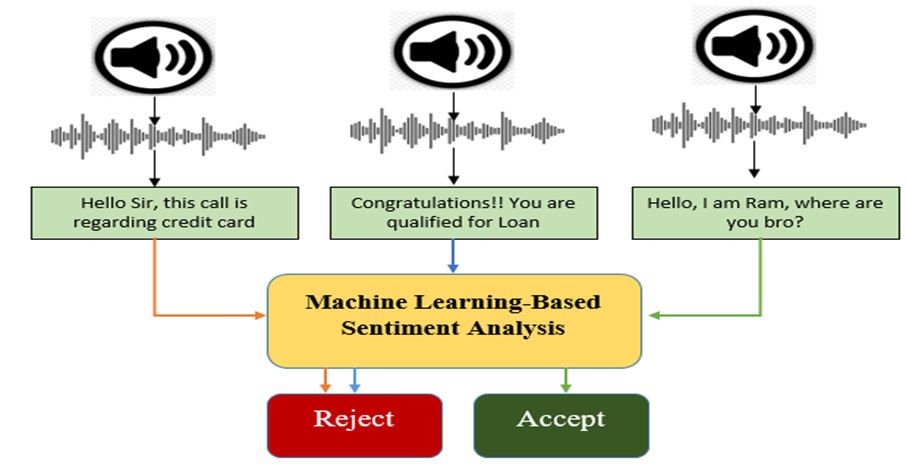Machine Learning-Based Sentiment Analysis of Incoming Calls on Helpdesk
Main Article Content
Abstract
In today's daily life we are getting so many anonymous calls. Some calls are related to loan marketing and finance. As per the survey, one person is getting 26% spam calls in a day. The proposed methodology accepts user calls and based on the conversation the spam numbers are identified and the same information is provided to the other callers. This is possible because of machine learning-based sentiment analysis. Sentiment analysis is the subdomain of machine learning. The goal of this research is to propose an adaptive methodology for incoming calls. The sentiment-based incoming calls help desk works with freely available lexical resources WordNet, SemCor, and OMSTI. The discussed methodology accepts user conversations in audio format the speech-to-text conversion of the audio will be done. After pre-processing the keyword is detected from the statement. The word2Vec word embedding technique is used for representing words from document space to vector space. The 150-200 dimensional word vector is generated. The WordNet is used for sense mapping and keyword identification. Based on the sentiment analysis of input calls the decision is taken whether to accept or reject calls. This methodology is generating superior results for supervised machine learning models.
Article Details
References
C. D. Kokane, S. D. Babar and P. N. Mahalle, "Word Sense Disambiguation for Large Documents Using Neural Network Model," 2021 12th International Conference on Computing Communication and Networking Technologies (ICCCNT), Kharagpur, India, 2021, pp. 1-5, doi: 10.1109/ICCCNT51525.2021.9580101.
Dhola, Kaushik, and Mann Saradva. "A comparative evaluation of traditional machine learning and deep learning classification techniques for sentiment analysis." 2021 11th international conference on cloud computing, data science & engineering (Confluence). IEEE, 2021.
Kokane, Chandrakant D., et al. "Word Sense Disambiguation: Adaptive Word Embedding with Adaptive-Lexical Resource." International Conference on Data Analytics and Insights. Singapore: Springer Nature Singapore, 2023.
Kim, SungHwan, et al. "Meta-analytic support vector machine for integrating multiple omics data." BioData mining 10 (2017): 1-14.
Yathiraju, D. . (2022). Blockchain Based 5g Heterogeneous Networks Using Privacy Federated Learning with Internet of Things. Research Journal of Computer Systems and Engineering, 3(1), 21–28. Retrieved from https://technicaljournals.org/RJCSE/index.php/journal/article/view/37
Mohanty, Mohan Debarchan, and Mihir Narayan Mohanty. "Verbal sentiment analysis and detection using recurrent neural network." Advanced Data Mining Tools and Methods for Social Computing. Academic Press, 2022. 85-106.
Xu, Xingwei, et al. "A novel multi-scale CNN and attention mechanism method with multi-sensor signal for remaining useful life prediction." Computers & Industrial Engineering 169 (2022): 108204.
Rather, Akhter Mohiuddin. "LSTM-Based deep learning model for stock prediction and predictive optimization model." EURO Journal on Decision Processes 9 (2021): 100001.
Mushtaq, Muhammad-Sajid, and Abdelhamid Mellouk. "Methodologies for subjective video streaming QoE assessment." Quality of Experience Paradigm in Multimedia Services (2017): 27-57.
Siti Julfiah, Muhammad Hasyim, & Andi Agussalim. (2023). Human-Computer Interaction: Method of Translation Facebook Auto Translation in Translating Arabic–Indonesian on Al Jazeera Channel Posts. International Journal of Intelligent Systems and Applications in Engineering, 11(4s), 527–535. Retrieved from https://ijisae.org/index.php/IJISAE/article/view/2723
H. A. Patrick, P. G. J, M. H. Sharief and U. Mukherjee, "Sentiment Analysis Perspective using Supervised Machine Learning Method," 2023 Fifth International Conference on Electrical, Computer and Communication Technologies (ICECCT), Erode, India, 2023, pp. 1-4, doi: 10.1109/ICECCT56650.2023.10179807.
T. L. Ben, N. Ravikumar R, P. C. R. Alla, G. Komala and K. Mishra, "Detecting Sentiment Polarities with Comparative Analysis of Machine Learning and Deep Learning Algorithms," 2023 International Conference on Advancement in Computation & Computer Technologies (InCACCT), Gharuan, India, 2023, pp. 186-190, doi: 10.1109/InCACCT57535.2023.10141741.

